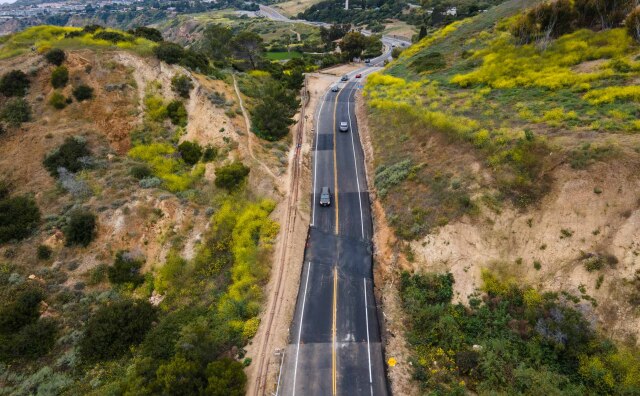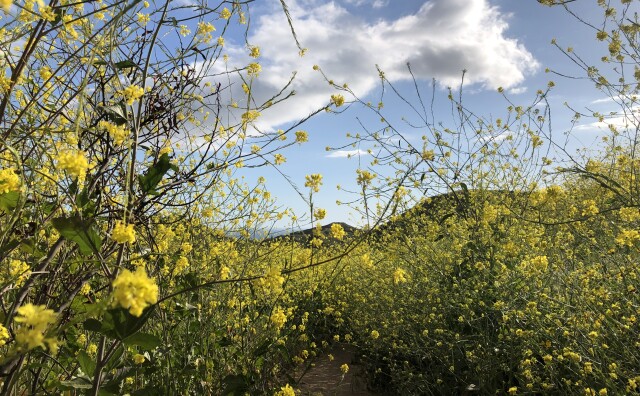Thousands of people across Southern California paused their daily routines on Monday to look up and take in a partial eclipse that saw roughly 50% of the sun blocked out by the moon.
From the California Institute of Technology to Cal State LA, to local observatories, parking lots, school yards and beyond, it was good 30 minutes of SoCal collectively looking up with protective eyewear as the partial eclipse peaked at 11:12 a.m.
“It looks like a croissant!” said Lindsey Mai, an employee of Bub & Grandma’s Restaurant in Eagle Rock. About 40 patrons and staff gathered on the sidewalk outside the sandwich shop or set up blankets and chairs in the median on Eagle Rock Boulevard, where the team from Solarc Brewing next door played classic tunes, handed out glasses and served iced tea and chai.


The solar event was one for the history books. According to NASA records, the most recent total eclipse in SoCal was in 1724 and another isn't forecast through the year 3000.
Mary Paul and her husband Jermaine came out from Long Beach with the whole family to check out the viewing party at Caltech.
“What better way to make memories than through academics and the kids being engaged,” said Mary. “So we felt like let's go, let's go as a family.”


“We’re all supposed to be in school but we're not,” she added with a laugh, “we're out here learning about the eclipse and it's just a real special time.”
One of her seven kids, Judah, was especially excited for the eclipse, and he said it’s a lot more fun with the whole family around.


“It feels like a once in a lifetime thing, it feels so awesome to look at it,” he said.
At Carpenter Charter Elementary in Studio City, the eclipse offered an opportunity to rectify previous mistakes — just before the 2017 event, the school found out their viewing glasses might not be safe. This year's glasses were secured by a group of parents, per principal Joseph Martinez.

This is the second eclipse of the year for teacher Lauren Manning's students. Back in October, they made pinhole cameras so they could safely watch the annular eclipse at home on the weekend.
"Anytime you have something like an eclipse, even just a rainbow," she said, "it's an opportunity for students to get excited about science, experience this crazy phenomenon and then figure out why it happens."

Her fourth grade students had a lot of queries about space:
- Zoe: “We're just on like one planet and there are so many others and it would be so cool to like actually go into space because like it goes on forever and there's so much that we don't know about it."
- Lucas: “People could someday go into space and find other planets that are unknown or different species up in space and they might even be able to get extra or new resources.”
- Ezra: “We could find other species on different planets. Like, for instance, you may call them aliens. I call them unspecified species. I think it would be really cool to, if we could, communicate with them in some way.”
- Harper: “It's just really cool to have that sort of like cloak of mystery upon something ... When you're sort of bored and stuff you can always just think, 'Huh, oh, OK, maybe I can think about space and what we can discover.'”

Ten-year-old Nathan Altamirano of Alhambra saw the eclipse at Caltech with his mom, Wendy Rodriguez, and aunt, Lorena Rodriguez. He was excited to get to witness the rare phenomenon, but mostly it was a moment that allowed him to appreciate his favorite planet — Earth.
“People say that we should start going to other planets, but we should start focusing on this planet and what we have to do here,” he said. “Because we are not keeping this planet healthy and we're polluting it, and when we see eclipses, we think what can we do to keep this here? Well, at least that's what I always think because everyone loves eclipses because everyone's here enjoying this moment. So we should try to do more to keep this here.”


They brought a cowskin drum and sound bowls to commemorate the moment and reflect on the family’s own Indigenous heritage, which has roots in El Salvador, Mexico and California.
“Without the sun, we wouldn't be able to have existence, not on Earth,” said Lorena. “And so being able to just pay respect to everything that happens in the universe and the little portion that we are a part of that and passing that down to our youth, it's important.”











